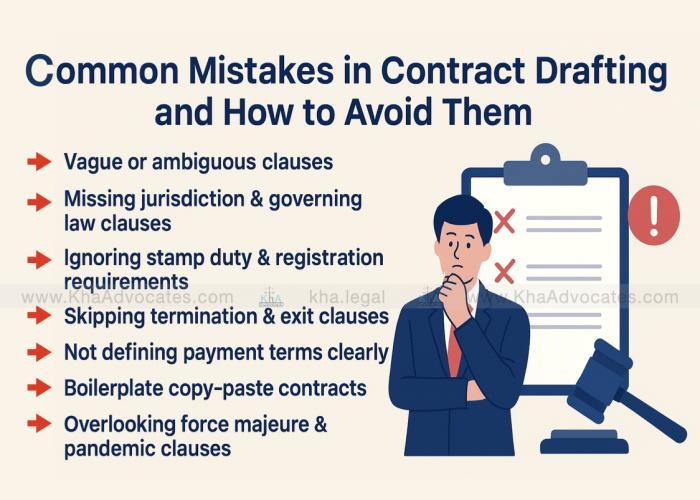

Introduction: Beyond Contracts, Into GrowthWhen we think of lawyers, many imagine courtroom battles, legal jargon, or lengthy contracts. But for business owners, especially in today’s competitive and compliance-heavy world, lawyers aren’t just defenders—they are growth partners. Corporate Legal Services is the invisible backbone that supports businesses in scaling sustainably, protecting assets, ensuring compliance, and avoiding legal landmines.In my years of working with startups, SMEs, and large corporations, I’ve witnessed a simple truth: businesses that treat legal as an afterthought often end up firefighting crises, while those that integrate legal strategy into their business model thrive with fewer roadblocks.This blog breaks down what Corporate Legal Services actually mean, why every business owner needs a corporate lawyer, and how the right legal partner can help build a future-proof enterprise.What Do Corporate Legal Services Actually Mean?Corporate Legal Services is a broad umbrella. It covers every legal aspect a business faces from the day it’s born to the day it grows, merges, or exits.Some of the core areas include:Business Formation & Structuring: Deciding whether to register as a Private Limited, LLP, or Partnership—each has tax, liability, and compliance implications.Contracts & Agreements: Drafting ironclad contracts with employees, vendors, and investors to prevent disputes.Corporate Governance & Compliance: Ensuring the company follows the Companies Act, SEBI guidelines, FEMA regulations, and other mandatory legal frameworks.Intellectual Property Protection: Safeguarding trademarks, copyrights, and patents from infringement.Mergers, Acquisitions & Investments: Navigating due diligence, negotiations, and regulatory clearances.Labour & Employment Laws: Ensuring HR policies are legally compliant to avoid penalties or employee disputes.Dispute Resolution & Litigation: Protecting the company’s interest in court, arbitration, or mediation.Taxation & Regulatory Advisory: Structuring business transactions for maximum tax efficiency.Foreign Investment & Cross-Border Transactions: Guiding NRIs and foreign entities through India’s complex FDI and FEMA regulations.In short, Corporate Legal Services are not limited to crisis management—they are proactive shields and growth catalysts.Why Every Business Owner Needs a Corporate Lawyer1. To Avoid Costly Mistakes Before They HappenI recall a case where a startup scaled rapidly but overlooked proper shareholder agreements. Within two years, when investors walked in, internal disputes crippled the company. A simple agreement, drafted early, could have prevented years of litigation.A corporate lawyer doesn’t just draft contracts—they foresee risks, plug loopholes, and ensure that no one can exploit your blind spots.2. To Build Investor ConfidenceInvestors don’t just invest in ideas—they invest in secure, compliant, legally sound businesses. A due diligence audit by investors will expose every missing compliance, pending tax, or weak contract. Businesses with corporate lawyers already in place shine through these audits and attract funding more easily.3. To Ensure Sustainable Growth, Not Just Short-Term WinsGrowth without legal compliance is like building a skyscraper on a shaky foundation. At first, everything seems fine—but cracks appear eventually. Corporate lawyers act as architects of stability, ensuring every new expansion, contract, or deal aligns with laws and reduces risk exposure.4. To Protect Intellectual PropertyImagine spending years building a brand, only to find someone else trademarked your name first. This happens more often than most business owners realize. Corporate lawyers ensure your brand, logo, content, and technology are protected legally.5. To Handle Employee & Labour Law ComplianceFrom ESOPs to termination policies, employee disputes can quickly escalate into legal battles. Corporate lawyers design legally sound HR policies that safeguard both employer and employee interests, reducing conflicts and ensuring harmony.6. To Defend Against Unforeseen DisputesEven with the best planning, disputes happen—be it with vendors, partners, or competitors. Having a corporate lawyer means you’re prepared for negotiations, arbitration, or court, without scrambling at the last minute.7. To Navigate an Ever-Changing Legal LandscapeIndian business laws—from GST to SEBI to RERA—are evolving constantly. Missing an update can mean penalties. A corporate lawyer keeps your business ahead of legal changes, ensuring compliance always stays on track.Case Studies: Real Lessons for Business OwnersCase Study 1: The Startup That Ignored Legal EarlyA Kolkata-based tech startup launched without a founders’ agreement. When one co-founder exited with crucial client data, the company spent years in litigation. A corporate lawyer would have drafted a binding agreement protecting the business from such fallout.Lesson: Legal foundations are as important as financial planning.Case Study 2: The SME That Gained Investor TrustAn SME in the manufacturing sector sought foreign investment. Because they had maintained clean compliance records, watertight contracts, and proper governance with the help of a corporate lawyer, the investor’s due diligence process was smooth. The deal closed faster than expected.Lesson: Legal preparedness attracts investment.Case Study 3: The Business That Saved Itself Through IP ProtectionA fashion entrepreneur trademarked her brand early with the help of her lawyer. A year later, another company tried launching under a similar name. The trademark protection not only stopped the competitor but also enhanced her brand’s credibility in the market.Lesson: Protecting intellectual property early safeguards long-term business value.The Hidden Fear of Business OwnersMost business owners carry silent anxieties:What if a vendor sues me?What if my employee misuses confidential data?What if my investor backs out due to non-compliance?What if a competitor copies my idea?Corporate Legal Services exist to transform these fears into confidence. With the right legal partner, business owners can focus on growth while leaving legal landmines behind.❌ Common Legal Risks Without a Corporate LawyerPoorly drafted contracts → costly disputesNon-compliance → penalties & shutdownsWeak IP protection → brand theftUnclear founder agreements → partner conflictsWrong structure → tax burdens & liabilitiesHow KHA Advocates Helps Businesses SucceedAt KHA Advocates, we believe legal services should not just solve problems—they should create opportunities. Our corporate legal team provides:End-to-end business structuring & incorporation support.Expert contract drafting, negotiation & review.Compliance management with MCA, SEBI, FEMA, and other regulators.Investor & funding support, including due diligence.IP protection & enforcement.Labour law & HR policy advisory.Litigation & dispute resolution for business conflicts.👉 Our mission is simple: help businesses grow without fear of legal roadblocks.Conclusion: Legal Is Not a Cost—It’s an InvestmentA corporate lawyer is not just someone you call when things go wrong. They are strategic partners who help you build, protect, and grow your business. From startups to corporates, the message is clear: legal preparedness = business sustainability.If you’re building a business, ask yourself: Do I want to firefight tomorrow, or grow with confidence today?Let's Get Connected with Best Corporate Law Firm :👉 Ready to secure your business with expert legal support?Contact KHA Advocates today for tailored corporate legal solutions that protect your vision and fuel your growth.📞 Call : 94-777-5-888-5📞 WhatsApp: 8101-555-666📧 Email: contact@khaadvocates.in🌐 Visit: www.KhaAdvocates.com
Read More
Why Every Business Owner Needs a Corporate Lawyer for Sustainable GrowthRunning a business is exciting—but it’s also full of legal challenges that can make or break your success. From business registration to trademark protection, from contract drafting to dispute resolution, a single legal misstep can cost entrepreneurs years of effort and significant financial loss.That’s why having a dedicated corporate lawyer is not just an option—it’s a necessity for every business owner who wants to scale confidently, stay compliant, and protect their interests.In this blog, we’ll explore the top reasons why business owners must engage a corporate lawyer and how legal expertise helps in building, protecting, and growing a company.1. Business Registration Made SimpleStarting a business in India requires more than just an idea—it requires the right legal structure. Whether you’re forming a Private Limited Company, LLP, Partnership, or Sole Proprietorship, each structure has different compliance requirements, tax implications, and liabilities.A corporate lawyer ensures: Correct business model selection (LLP, Pvt. Ltd, Partnership etc.). Registration with Registrar of Companies (ROC). Assistance with PAN, TAN, GST, PF & ESI registrations. Guidance on legal licenses & approvals required in your sector.2. Trademark Registration & Brand ProtectionYour brand name, logo, and tagline are the face of your business. Without trademark registration, anyone can copy your brand identity and misuse it.A corporate lawyer provides:Trademark search to avoid future disputes.Filing of TM application with the Intellectual Property Office.Handling trademark oppositions, objections, and renewals.Legal action against infringers or counterfeiters.Protecting your intellectual property ensures that your brand reputation and goodwill remain exclusively yours.3. 24/7 Legal Support & Risk MitigationBusiness never sleeps, and neither do risks. From sudden employee issues to urgent contract negotiations, having round-the-clock legal support saves you from costly mistakes.A corporate lawyer helps in:Immediate advice on urgent business legal issues.Drafting quick legal notices or replies.Protecting against regulatory penalties.Managing unexpected legal disputes.4. Legal Documentation & CompliancePoorly drafted legal documents are a ticking time bomb for any business. From vendor agreements to employment contracts, every document must be airtight.Corporate lawyers assist in drafting and reviewing:Partnership Deeds & Founders’ Agreements.Vendor & Supplier Contracts.Employment Agreements & HR Policies.Non-Disclosure Agreements (NDAs).Loan Agreements & Lease Deeds.They also ensure you stay updated with labour laws, tax regulations, and corporate governance standards, reducing the risk of penalties.5. Litigation Support & Dispute ResolutionDisputes are inevitable in business, but how you handle them determines your growth. A corporate lawyer protects your business from prolonged legal battles.Support includes:Representing your company in civil and commercial litigation.Arbitration and mediation for faster resolutions.Defence against false claims or frivolous cases.Ensuring disputes are settled without affecting business operations.6. Contract Drafting & NegotiationContracts form the backbone of every business transaction. Poorly written contracts can lead to disputes, financial losses, and even business shutdown.A corporate lawyer ensures:Clarity in terms and conditions.Protection of your rights & liabilities.Drafting partnership agreements, MoUs, service contracts, and franchise agreements.Negotiating terms that safeguard your interests.7. Proactive Risk ManagementOne of the biggest advantages of having a corporate lawyer is prevention over cure. Instead of firefighting legal problems after they arise, your lawyer ensures you stay one step ahead.Regular legal audits of your business.Identifying future risks in contracts, investments, and partnerships.Ensuring your business remains legally protected as it grows.8. Peace of Mind for Business OwnersWhen you know that your legal matters are in expert hands, you can focus on what truly matters—innovation, growth, and profitability.Instead of wasting time researching complex laws, drafting legal documents, or fighting disputes alone, you have a dedicated legal partner who takes care of everything.That’s why smart entrepreneurs see a corporate lawyer not as a cost, but as an investment in business security and growth.ConclusionWhether you’re a startup founder or running an established company, having a corporate lawyer by your side is essential. From business registration to trademark protection, 24/7 legal support, contract drafting, litigation, and dispute resolution, your lawyer ensures that your business stays protected, compliant, and future-ready.👉 At KHA Advocates, we provide end-to-end corporate legal services designed to safeguard your business interests and support long-term growth.📞 Contact us today to book a consultation and ensure your business is legally future-proof.
Read More
IntroductionContracts are the backbone of every business relationship. Whether you’re a startup signing your first vendor agreement or a corporation negotiating a multi-crore deal, a poorly drafted contract can lead to disputes, losses, and even litigation. In India, contract drafting is governed primarily by the Indian Contract Act, 1872, along with provisions of the Indian Stamp Act, 1899, and relevant judgments by the Supreme Court and High Courts.In this blog, we’ll explore the most common mistakes made during contract drafting, legal consequences, landmark judgments, and practical tips on how to avoid them.1. Vague or Ambiguous ClausesMistake: Using unclear terms such as “reasonable time,” “best efforts,” or “mutual understanding.”Consequence: Leads to multiple interpretations and disputes.Case Law: ONGC v. Saw Pipes Ltd. (2003) – The Supreme Court held that vague clauses can render contracts unenforceable if they lack certainty.Solution: Always use precise, measurable language. For example, instead of “deliver goods on time,” specify “deliver 500 units within 30 days.”2. Missing Jurisdiction & Governing Law ClausesMistake: Failing to specify which court or state laws will govern disputes.Consequence: Parties may file cases in multiple jurisdictions, leading to unnecessary litigation.Case Law: Swastik Gases Pvt. Ltd. v. Indian Oil Corporation Ltd. (2013) – The Supreme Court emphasized the importance of jurisdiction clauses.Solution: Insert a clear clause like: “This Agreement shall be governed by the laws of India, and courts at Kolkata shall have exclusive jurisdiction.”3. Ignoring Stamp Duty & Registration RequirementsMistake: Contracts like leases, partnerships, or property agreements often remain unstamped or unregistered.Consequence: Courts may refuse to admit such documents as evidence.Law: Indian Stamp Act, 1899 and Registration Act, 1908.Example: An unstamped lease deed exceeding 12 months can be declared invalid.Solution: Always calculate proper stamp duty and register agreements wherever required.4. Skipping Termination & Exit ClausesMistake: Not defining conditions for termination or exit of parties.Consequence: Leads to endless disputes when parties want to exit.Case Law: Tata Consultancy Services Ltd. v. Cyrus Investments Pvt. Ltd. (2021) – The importance of clear exit clauses in shareholder agreements was highlighted.Solution: Define termination events (breach, insolvency, force majeure) and lay down notice periods, penalties, and handover procedures.5. Not Defining Payment Terms ClearlyMistake: Contracts state “payment shall be made promptly” without defining mode, due date, or late fee.Consequence: Disputes over payment delays and penalties.Law: Indian Contract Act, 1872 (Section 73 – Compensation for Breach of Contract).Solution: Specify “Payment of ₹10,00,000 shall be made via bank transfer within 15 days of invoice, with 12% interest applicable on delays.”6. Boilerplate Copy-Paste Contracts Mistake: Using internet templates without customization.Consequence: Many clauses may be irrelevant, illegal, or contradictory.Case Study: A startup copied an NDA template online, which did not comply with Indian law. During litigation, the court rejected parts of the NDA.Solution: Always customize contracts based on Indian law, industry, and party requirements.7. Overlooking Force Majeure & Pandemic ClausesMistake: Not including provisions for unforeseen events like pandemics, wars, or natural disasters.Case Law: Halliburton Offshore Services v. Vedanta Ltd. (2020, Delhi HC) – The court recognized COVID-19 as a force majeure event.Solution: Define force majeure events, notification timelines, and consequences (suspension or termination).Practical Tips for Safe Contract DraftingHire a Lawyer: Professional vetting prevents loopholes.Review Twice: Both parties should review drafts carefully.Update Regularly: Revise old contracts to include latest laws and judgments.Use Clear Language: Avoid jargon, keep it simple.FAQs on Contract DraftingQ1. Is an oral contract valid in India?Yes, oral contracts are valid under the Indian Contract Act, 1872, but difficult to prove in court. Always prefer written contracts.Q2. What makes a contract legally enforceable in India?Offer, acceptance, lawful consideration, free consent, lawful object, and capacity of parties.Q3. Can a contract be on plain paper without stamp duty?Yes, it’s valid but may not be admissible in court without proper stamping.Q4. What happens if a contract has a missing clause?Courts may interpret it against the drafter, leading to unfavorable judgments.Q5. How can startups ensure safe contract drafting?By consulting a corporate lawyer to draft customized agreements like Founders’ Agreement, Shareholders’ Agreement, and Employment Contracts.Q6. Do contracts need witnesses?Not always. Only certain agreements like property deeds, wills, or surety bonds need attestation.Q7. Can e-contracts and digital signatures be used in India?Yes, under the Information Technology Act, 2000, e-signatures and e-contracts are legally valid.At KHA Advocates, we specialize in contract drafting, vetting, and negotiation for startups, corporates, and individuals. Our expert lawyers ensure your agreements are legally enforceable, customized to your needs, and dispute-proof.👉 Avoid costly litigation – Book a consultation with KHA Advocates today!
Read More
Maternity Leave as a Reproductive Right: Supreme Court Overturns Denial for Third ChildIn a landmark decision, the Supreme Court of India has ruled that maternity leave is an integral component of a woman’s reproductive rights. This judgment came as the Court set aside a Madras High Court order that denied maternity leave to a government school teacher for the birth of her third child, citing the state’s two-child policy. Case BackgroundThe petitioner, a government school teacher in Tamil Nadu, had two children from her first marriage, both of whom are in the custody of their father. After remarrying in 2018, she gave birth to her third child—the first child from her second marriage and the first since joining government service. When she applied for maternity leave, the state government rejected her request, citing a policy that restricts maternity benefits to women with fewer than two surviving children. A single judge of the Madras High Court initially ruled in her favor, stating that Section 5 of the Maternity Benefit Act, 1961, does not limit the number of deliveries for which maternity benefits can be claimed. However, this decision was overturned by a Division Bench of the High Court, leading the petitioner to approach the Supreme Court. Supreme Court’s RulingA bench comprising Justice Abhay S. Oka and Justice Ujjal Bhuyan held that maternity benefits are part of reproductive rights and that maternity leave is integral to those benefits. The Court emphasized that reproductive rights are recognized under various international human rights laws, encompassing the rights to health, privacy, equality, non-discrimination, and dignity. The Court observed that the state’s objective of population control through a two-child policy is laudable but should not infringe upon a woman’s fundamental rights. It noted that the petitioner had not availed maternity leave for her first two children, as they were born before she joined government service, and that the third child was her first during her tenure as a government employee. Implications of the JudgmentThis ruling underscores the importance of viewing maternity leave not merely as a statutory benefit tied to employment conditions but as a fundamental right linked to a woman’s reproductive autonomy. It sets a precedent that policies aimed at population control should be harmonized with the rights of women to ensure they do not face discrimination or denial of benefits due to personal circumstances such as remarriage or custody arrangements. ConclusionThe Supreme Court’s decision reinforces the principle that maternity leave is a constitutional guarantee and a vital aspect of reproductive rights. It calls upon state policies to align with this understanding, ensuring that women’s rights are upheld irrespective of the number of children they have or their marital history. References:LiveLaw: Maternity Leave Part Of Reproductive Rights: Supreme Court Sets Aside Denial Of Maternity Leave For Third ChildTimes of India: Maternity leave constitutional guarantee, says SC, junks HC order denying it for 3rd childbirthIndia Today: Maternity leave integral to rights: Court on benefits extended to working women
Read More
KhA Advocates is a premier law firm in Kolkata, West Bengal known Internationally, providing expert legal services in property registration, corporate law, matrimonial law, taxation, dispute resolution, and more. We offer tailored legal solutions for NRIs, businesses, and residents, ensuring 100% compliance and protection. With our efficient, transparent, and reliable approach, we safeguard your legal interests.
Copyright @2024 KHA Advocates
Designed by Webina Tech
Please read and accept our Terms & Conditions and Privacy Policy to continue using our site.

